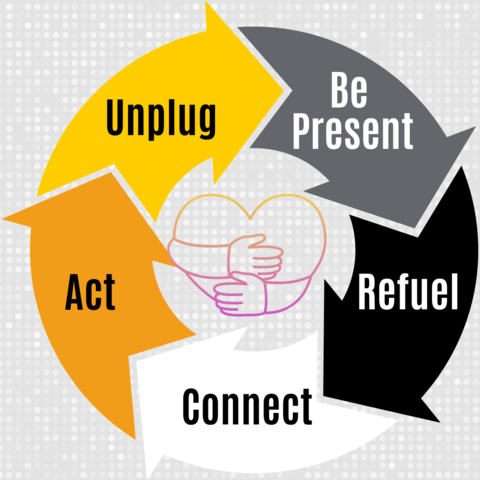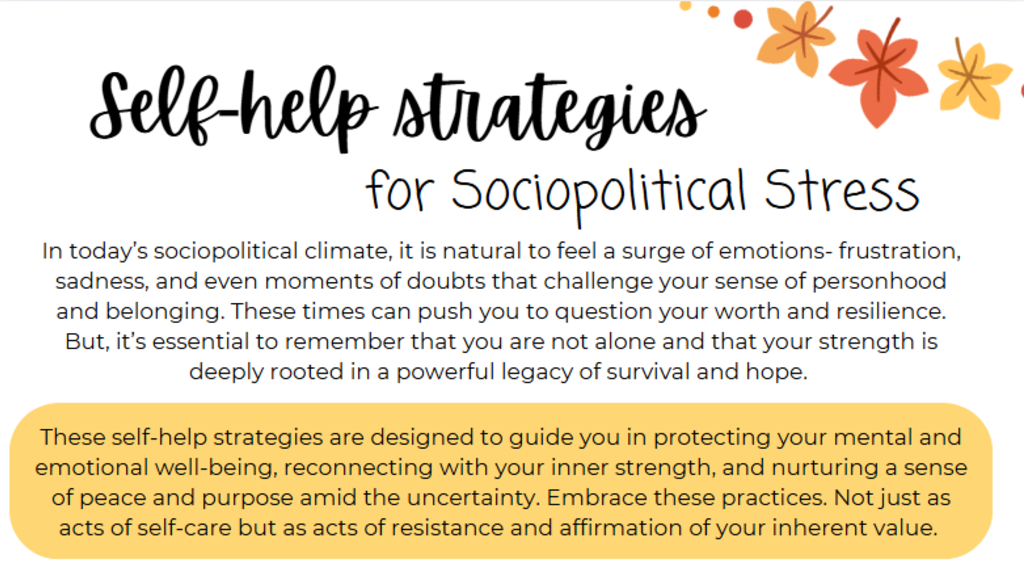Breadcrumb
Coping with Sociopolitical Stress and Natural Disasters
Coping with Grief and Loss
People may experience grief and loss related to natural disasters and sociopolitical events.
Supporting Others in Distress
Check out signs of distress and available resources on campus and in the local community.
If you need IMMEDIATE help...
There are multiple time-sensitive and crisis resources available for you.
Sociopolitical stress and the increasing frequency of natural disasters have been shown to profoundly impact mental health, especially among college students. Continuous exposure to news, social media, and personal experiences related to these events can lead to heightened levels of anxiety, anger, and depression. Recognizing the relationship between these stressors and mental health is critical in developing effective coping strategies. By understanding the factors contributing to this stress and adopting healthy ways to manage it, individuals can better navigate the complexities of our polarized and unpredictable world, ultimately supporting their overall well-being.
Five Coping Strategies to Maintain Your Well-being

Unplug
Limit your consumption of news and social media. It’s important to stay informed, but creating boundaries is also important. It's tempting to continue to plug in, but too much information can be overwhelming and add to your anxiety. Limit your screen time to 30 minutes and take breaks--"doomscrolling" isn't helpful for anyone.
Be Present
Use reflection to recognize your inner thoughts and feelings. Be curious and non-judgmental and give yourself permission to feel the way you do. Although avoiding can be useful, “stuffing” or ignoring strong emotions can have negative impacts. Check out our workshops to learn more skills to cope with procrastination, anxious thoughts, and/or intense distressing emotions.
Refuel
Focus on restoring yourself with rest and healthy food. Drink water and try to limit caffeine. Move a little every day. Take a walk; look at the sky; be in nature. Journal or meditate. Make art or watch funny videos. Read something fun. Check out this worksheet to generate a list of activities that refuel you!
Connect
Engage with supportive friends, family, and allies. Talk about current issues, if needed, but be aware of when you’re feeling overwhelmed. Not everyone will share your perspective, so it’s OK to limit your topics and avoid heated conflict. Reach out to supportive services on-campus, including University Counseling Service.
Act
Channel what you’re feeling into positive, meaningful activity. Be informed and proactive around issues that matter to you or look for opportunities to help those impacted. Find ways to engage in your community through advocacy and support in ways that fit for you.
Additional Resources

Self-Help Strategies for Times of Uncertainty
These self-help strategies are designed to guide you in protecting your mental and emotional well-being, reconnecting with your inner strength, and nurturing a sense of peace and purpose amid uncertainty.

Let's Talk, Hawks! sessions
It's an opportunity for you to have 15-minute 1-on-1 informal conversation with a UCS staff to learn mental health skills and resources, share your mental health concerns, work on problem solving together, or ask questions about counseling and UCS. No paperwork is required.